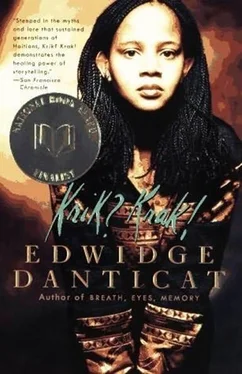Jacqueline took a long piece of black cloth out of her bundle and wrapped it around her belly.
"Sister," she said, "life is never lost, another one always comes up to replace the last. Will you come watch when they burn the body?"
"What would be the use?" I said.
"They will make these women watch, and we can keep them company."
When Jacqueline took my hand, her fingers felt balmy and warm against the lifelines in my palm. For a brief second, I saw nothing but black. And then I saw the crystal glow of the river as we had seen it every year when my mother dipped my hand in it.
"I would go," I said, "if I knew the truth, whether a woman can fly."
"Why did you not ever ask your mother," Jacqueline said, "if she knew how to fly?"
Then the story came back to me as my mother had often told it. On that day so long ago, in the year nine-teen hundred and thirty-seven, in the Massacre River, my mother did fly. Weighted down by my body inside hers, she leaped from Dominican soil into the water, and out again on the Haitian side of the river. She glowed red when she came out, blood clinging to her skin, which at that moment looked as though it were in flames.
In the prison yard, I held the Madonna tightly against my chest, so close that I could smell my mother's scent on the statue. When Jacqueline and I stepped out into the yard to wait for the burning, I raised my head toward the sun thinking, One day I may just see my mother there.
"Let her flight be joyful," I said to Jacqueline. 'And mine and yours too."
"Listen to what happened today," Guy said as he barged through the rattling door of his tiny shack.
His wife, Lili, was squatting in the middle of their one-room home, spreading cornmeal mush on banana leaves for their supper.
"Listen to what happened to me today!" Guy's seven-year-old son-Little Guy-dashed from a corner and grabbed his father's hand. The boy dropped his composition notebook as he leaped to his father, nearly step-ping into the corn mush and herring that his mother had set out in a trio of half gourds on the clay floor.
"Our boy is in a play" Lili quickly robbed Little Guy of the honor of telling his father the news.
"A play?" Guy affectionately stroked the boy's hair.
The boy had such tiny corkscrew curls that no amount of brushing could ever make them all look like a single entity. The other boys at the Lycée Jean-Jacques called him "pepper head" because each separate kinky strand was coiled into a tight tiny ball that looked like small peppercorns.
"When is this play?" Guy asked both the boy and his wife. 'Are we going to have to buy new clothes for this?"
Lili got up from the floor and inclined her face towards her husband's in order to receive her nightly peck on the cheek.
"What role do you have in the play?" Guy asked, slowly rubbing the tip of his nails across the boy's scalp. His fingers made a soft grating noise with each invisible circle drawn around the perimeters of the boy's head. Guy's fingers finally landed inside the boy's ears, forcing the boy to giggle until he almost gave himself the hiccups.
"Tell me, what is your part in the play?" Guy asked again, pulling his fingers away from his son's ear.
"I am Boukman," the boy huffed out, as though there was some laughter caught in his throat.
"Show Papy your lines," Lili told the boy as she arranged the three open gourds on a piece of plywood raised like a table on two bricks, in the middle of the room. "My love, Boukman is the hero of the play"
The boy went back to the corner where he had been studying and pulled out a thick book carefully covered in brown paper.
"You're going to spend a lifetime learning those." Guy took the book from the boy's hand and flipped through the pages quickly. He had to strain his eyes to see the words by the light of an old kerosene lamp, which that night-like all others-flickered as though it was burning its very last wick.
'All these words seem so long and heavy," Guy said. "You think you can do this, son?"
"He has one very good speech," Lili said. "Page forty, remember, son?"
The boy took back the book from his father. His face was crimped in an of-course-I-remember look as he searched for page forty.
"Boukman," Guy struggled with the letters of the slave revolutionary's name as he looked over his son's shoulders. "I see some very hard words here, son."
"He already knows his speech," Lili told her husband.
"Does he now?" asked Guy.
"We've been at it all afternoon," Lili said. "Why don't you go on and recite that speech for your father?"
The boy tipped his head towards the rusting tin on the roof as he prepared to recite his lines.
Lili wiped her hands on an old apron tied around her waist and stopped to listen.
"Remember what you are," Lili said, "a great rebel leader. Remember, it is the revolution."
"Do we want him to be all of that?" Guy asked.
"He is Boukman," Lili said. "What is the only thing on your mind now, Boukman?"
"Supper," Guy whispered, enviously eyeing the food cooling off in the middle of the room. He and the boy looked at each other and began to snicker.
"Tell us the other thing that is on your mind," Lili said, joining in their laughter.
"Freedom!" shouted the boy, as he quickly slipped into his role.
"Louder!" urged Lili.
"Freedom is on my mind!" yelled the boy.
"Why don't you start, son?" said Guy. "If you don't, we'll never get to that other thing that we have on our minds."
The boy closed his eyes and took a deep breath. At first, his lips parted but nothing came out. Lili pushed her head forward as though she were holding her breath. Then like the last burst of lightning out of clearing sky, the boy began.
"A wall of fire is rising and in the ashes, I see the bones of my people. Not only those people whose dark hollow faces I see daily in the fields, but all those souls who have gone ahead to haunt my dreams. At night I relive once more the last caress-es from the hand of a loving father, a valiant love, a beloved friend."
It was obvious that this was a speech written by a European man, who gave to the slave revolutionary Boukman the kind of European phrasing that might have sent the real Boukman turning in his grave. How- ever, the speech made Lili and Guy stand on the tips of their toes from great pride. As their applause thundered in the small space of their shack that night, they felt as though for a moment they had been given the rare plea-sure of hearing the voice of one of the forefathers of Haitian independence in the forced baritone of their only child. The experience left them both with a strange feeling that they could not explain. It left the hair on the back of their necks standing on end. It left them feeling much more love than they ever knew that they could add to their feeling for their son.
"Bravo," Lili cheered, pressing her son into the folds of her apron. "Long live Boukman and long live my boy."
"Long live our supper," Guy said, quickly batting his eyelashes to keep tears from rolling down his face.

The boy kept his eyes on his book as they ate their sup-per that night. Usually Guy and Lili would not have allowed that, but this was a special occasion. They watched proudly as the boy muttered his lines between swallows of cornmeal.
The boy was still mumbling the same words as the three of them used the last of the rainwater trapped in old gasoline containers and sugarcane pulp from the nearby sugarcane mill to scrub the gourds that they had eaten from.
When things were really bad for the family, they boiled clean sugarcane pulp to make what Lili called her special sweet water tea. It was supposed to suppress gas and kill the vermin in the stomach that made poor children hungry. That and a pinch of salt under the tongue could usually quench hunger until Guy found a day's work or Lili could manage to buy spices on credit and then peddle them for a profit at the marketplace.
Читать дальше













